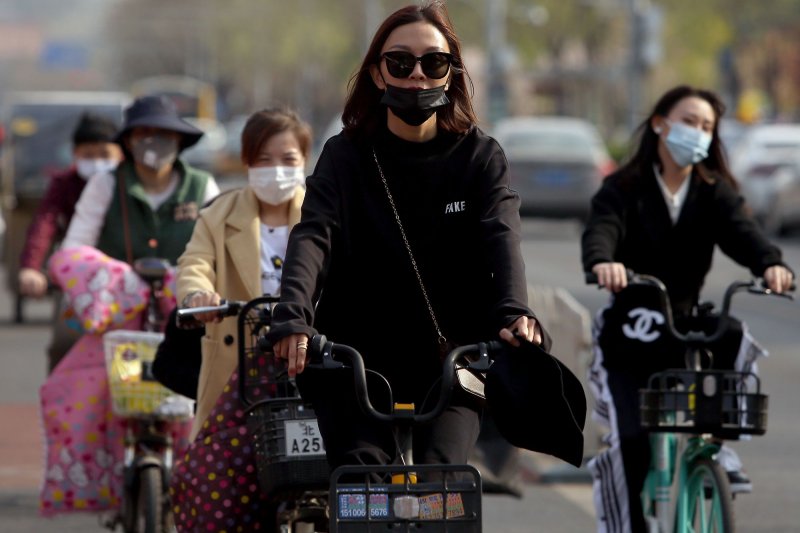U.N. chief: Now is not the time for U.S. to stop WHO funding

Bicyclists wear protective face masks amid the coronavirus crisis in Beijing on Thursday. China reported 10 new local cases Wednesday and three dozen that were imported. Photo by Stephen Shaver/UPI | License Photo
April 15 (UPI) -- United Nations Secretary-General Antonio Guterres responded late Tuesday to U.S. President Donald Trump's decision to halt funding to the World Health Organization, saying now's not the time to pull its primary source of support.
Guterres said there will be time when the coronavirus pandemic is over to reflect and examine how those involved reacted to the crisis.
"It is also not the time to reduce the resources for the operations of the World Health Organization or any other humanitarian organization in the fight against the virus," he said in a statement. "As I have said before, now is the time for unity and for the international community to work together in solidarity to stop this virus and its shattering consequences."

Earlier Tuesday, Trump announced he would pull WHO funding as part of his administration's review of the group's response to the COVID-19 outbreak. He accused the organization of "mismanaging and covering up" the virus' spread and said the United States, the WHO's leading donor, demands "full accountability."
"America and the world have chosen to rely on the WHO for accurate, timely and independent information to make important public health recommendations and decisions," Trump said. "If we cannot trust that this is what we will receive from the WHO, our country will be forced to find other ways to work with other nations to achieve public health goals."
The decision was met with swift criticism from American Medical Association President Patrice Harris and billionaire philanthropist Bill Gates.
Halting funding for the World Health Organization during a world health crisis is as dangerous as it sounds. Their work is slowing the spread of COVID-19 and if that work is stopped no other organization can replace them. The world needs @WHO now more than ever.— Bill Gates (@BillGates) April 15, 2020

India lockdown
Meanwhile, India published revised lockdown guidelines on Wednesday outlining a relaxing of restrictions.
Prime Minister Narendra Modi said a day earlier the 21-day lockdown would be extended until May
3.
Since last month, much of India's transportation system ground to a halt, cinemas and shopping malls were ordered to close and religious halls and places of worship were shuttered.
Some of the world's most stringent lockdown rules will continue under the new guidelines, but come Monday, fisheries, animal husbandry and tea, coffee and rubber plantations, among other agricultural activities, may open for work again, the government said. Other industries to be affected include farming, supplies manufacturers and other agricultural-related businesses.
China dropChina reported a drop in new cases Wednesday, signaling efforts to stem infections across its border from Russia may be working.
Beijing's National Health Commission recorded 46 new cases. All but 10 were imported. China has implemented a series of measures, such as closing all land border checkpoints with Russia to stop infections from entering -- particularly through Heilongjiang, China's northernmost province that's received many of the foreign cases.
Since it began announcing imported cases last month, China has reported 1,500 from abroad. The new infections increase its total to about 82,300. The health commission also reported one death.
Scenes from a pandemic: World copes with COVID-19

Pedestrians walk past a police vehicle in Jerusalem on April 12. The Israeli government deployed 1,000 police officers to enforce a full closure on Jewish religious neighborhoods with the highest rate of coronavirus. Photo by Debbie Hill/UPI | License Photo
No comments:
Post a Comment